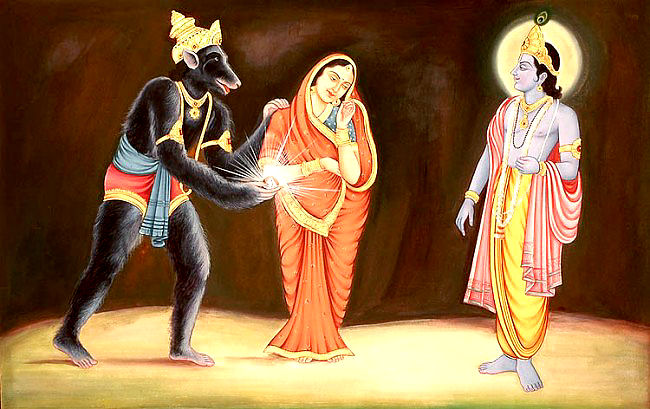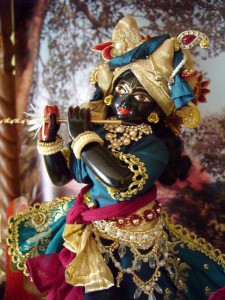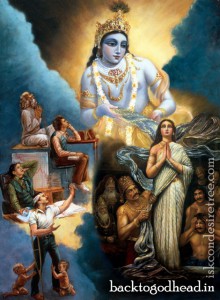The Story of Jāmbavān and the Syamantaka Jewel
The Origin of the Syamantaka Jewel
There was once a king named Satrājit who lived within the jurisdiction of Dvārakādhāma. He was a great devotee of the sun-god, who rewarded him with a magnificent jewel known as the Syamantaka. This jewel caused a misunderstanding between King Satrājit and the Yadu dynasty. However, the matter was eventually resolved when Satrājit voluntarily offered Kṛṣṇa his daughter, Satyabhāmā, along with the Syamantaka jewel. Not only was Satyabhāmā married to Kṛṣṇa because of the Syamantaka jewel, but Jāmbavatī, the daughter of Jāmbavān, was also married to Kṛṣṇa.
Satrājit’s Devotion and the Misunderstanding
King Satrājit developed a close relationship with the sun-god, who gave him the Syamantaka jewel. When Satrājit wore this jewel, he appeared like an imitation sun-god, leading the people of Dvārakā to mistake him for the sun-god when he entered the city. Although Kṛṣṇa recognized Satrājit, the other inhabitants did not, and they informed Kṛṣṇa of the supposed arrival of the sun-god.
The Refusal to Offer the Jewel
Despite Kṛṣṇa’s request that Satrājit offer the jewel to King Ugrasena, the ruler of the Yadu dynasty, Satrājit refused. He instead installed the jewel in a temple and engaged brāhmaṇas to worship it, deriving great material benefit from the jewel’s daily production of gold. This refusal set the stage for further misunderstandings.
The Disappearance of the Syamantaka Jewel
Satrājit’s younger brother, Prasena, took the jewel into the forest, where he was killed by a lion. Jāmbavān, the king of the bears, discovered the lion’s cave, killed the lion, and took the jewel, giving it to his son as a toy. When Prasena did not return, rumors spread that Kṛṣṇa had taken the jewel by force, leading Kṛṣṇa to search for it Himself.
The Battle Between Kṛṣṇa and Jāmbavān
Kṛṣṇa discovered the jewel in Jāmbavān’s cave. However, Jāmbavān, not recognizing Kṛṣṇa, challenged Him to a fight. The two engaged in a fierce battle that lasted for twenty-eight days. Finally, Jāmbavān recognized Kṛṣṇa as the Supreme Personality of Godhead and offered Him prayers, along with the Syamantaka jewel and his daughter, Jāmbavatī, in marriage.
The Reconciliation and Return to Dvārakā
After the battle, Kṛṣṇa returned to Dvārakā with Jāmbavatī. The citizens, who had feared for Kṛṣṇa’s safety, rejoiced at His return. Satrājit, realizing his mistake and seeking to atone, offered the Syamantaka jewel and his daughter, Satyabhāmā, to Kṛṣṇa. Kṛṣṇa accepted Satyabhāmā as His wife but returned the jewel, advising Satrājit to keep it in the temple for the benefit of all.
Lessons to Be Learned from the Story of Jāmbavān
The Danger of Material Attachment: Satrājit’s refusal to part with the Syamantaka jewel, despite Kṛṣṇa’s request, and Jāmbavān’s initial attachment to it, illustrate how material attachment can lead to misunderstandings and conflict. The story teaches us to be wary of becoming too attached to material possessions, which can cloud our judgment and spiritual vision.
The Power of Recognition and Devotion: Jāmbavān’s realization that Kṛṣṇa was the Supreme Lord transformed his attitude from hostility to devotion. This demonstrates the importance of recognizing the divine presence in our lives and surrendering to it. True understanding and peace come when we acknowledge and serve the Supreme.
The Importance of Reconciliation: Both Jāmbavān and Satrājit sought to make amends after realizing their mistakes. Their willingness to reconcile with Kṛṣṇa highlights the value of humility, repentance, and the desire to restore harmony after wrongdoing.
Kṛṣṇa’s Compassion and Justice: Kṛṣṇa’s actions throughout the story—fighting Jāmbavān, accepting Satyabhāmā in marriage, and returning the Syamantaka jewel—illustrate His compassionate and just nature. Kṛṣṇa resolves conflicts with fairness and ensures that righteousness prevails, reminding us that divine justice is both merciful and fair.
The Eternal Nature of the Divine: Jāmbavān’s recognition of Kṛṣṇa as the same Lord Rāmacandra he had served in a previous age underscores the eternal nature of the divine. The Supreme Lord transcends time and space, appearing in different forms to guide and protect His devotees.
Prayer for Recognition and Devotion
O Supreme Lord Kṛṣṇa, the source of all strength and knowledge, We bow before You, seeking Your grace and guidance.
Grant us the wisdom to recognize You in all aspects of our lives, And to surrender our material attachments at Your lotus feet.
Like Jāmbavān, may we realize the futility of opposing Your will, And embrace the path of devotion and service to You.
O Lord, help us to reconcile with those we have wronged, And to seek Your forgiveness and blessings in all our endeavors.
May we always remember that You are the eternal protector, And that all power, wealth, and beauty come from You alone.
Hare Kṛṣṇa, Hare Kṛṣṇa, Kṛṣṇa Kṛṣṇa, Hare Hare, Hare Rāma, Hare Rāma, Rāma Rāma, Hare Hare.
Om Tat Sat.



